Structural Composite Lumber (SCL) Market Insights 2025, Analysis and Forecast to 2030, by Manufacturers, Regions, Technology, Application, Product Type
- Single User License (1 Users) $ 3,800
- Team License (2~5 Users) $ 4,800
- Corporate License (>5 Users) $ 5,800
Introduction
Structural Composite Lumber (SCL) is a family of engineered wood products created by bonding wood veneers, strands, or flakes layer by layer with adhesives under controlled conditions. This advanced material category includes Laminated Veneer Lumber (LVL), Parallel Strand Lumber (PSL), Laminated Strand Lumber (LSL), and Oriented Strand Lumber (OSL). SCL products are manufactured through sophisticated engineering processes that optimize wood fiber orientation and bonding to achieve superior strength-to-weight ratios compared to conventional solid timber. The industry serves diverse construction applications including residential framing, commercial buildings, industrial structures, and repair and remodel projects. These products offer exceptional dimensional stability, predictable performance characteristics, and the ability to span longer distances with reduced support requirements, making them indispensable for modern construction methodologies.
Market Size and Growth Forecast
The global Structural Composite Lumber market is estimated to reach 7.5-8.5 billion USD in 2025, with projected compound annual growth rates of 4.5%-6.0% through 2030. This growth trajectory reflects expanding construction activities in emerging economies, increasing adoption of engineered wood products in sustainable building practices, and growing recognition of SCL's performance advantages over traditional lumber. The market benefits from regulatory support for sustainable construction materials, technological advancements in manufacturing processes, and the increasing complexity of architectural designs requiring high-performance structural components.
Regional Analysis
North America dominates the SCL market with estimated growth rates of 4.8%-5.5%, driven primarily by robust residential construction activities and extensive commercial building projects in the United States and Canada. The region benefits from well-established manufacturing infrastructure, advanced distribution networks, and strong regulatory frameworks supporting engineered wood products. In 2024, Weyerhaeuser sold 4,500 million board feet of structural lumber, demonstrating the scale of market operations. Major players including Weyerhaeuser, Boise Cascade, and Louisiana Pacific maintain significant production capacity and comprehensive product portfolios serving diverse construction segments. The United States market particularly benefits from ongoing renovation activities, with housing starts showing fluctuating but generally positive trends through 2025.
Asia Pacific demonstrates growth potential of 5.5%-7.0%, primarily driven by rapid urbanization and infrastructure development in China, India, and Southeast Asian countries. The region's expanding middle class and increasing adoption of modern construction techniques create substantial demand for high-performance building materials. Japan maintains advanced technical capabilities and strong market presence in premium SCL products, while Australia and New Zealand contribute through established forestry industries and growing domestic construction activities.
Europe exhibits growth rates of 4.0%-5.0%, with sustainable building initiatives and stringent environmental regulations driving adoption of certified engineered wood products. Germany, France, and the United Kingdom lead in implementing green building standards that favor renewable construction materials. Scandinavian countries maintain strong forestry traditions and advanced manufacturing capabilities in engineered wood technologies.
South America shows moderate growth potential of 3.5%-4.5%, with Brazil and Chile benefiting from abundant forest resources and expanding construction markets. The region's growing infrastructure investment and increasing urbanization support long-term demand development.
The Middle East and Africa region demonstrates emerging growth opportunities of 3.0%-4.0%, with Gulf states driving demand through large-scale construction projects and diversification initiatives. South Africa maintains established wood processing capabilities serving regional markets.
Application Analysis
New Residential Construction represents the largest application segment with projected growth of 5.0%-6.5%, driven by housing demand in urban and suburban markets. SCL products serve critical applications including floor joists, roof beams, headers, and rim boards. The segment benefits from builder preferences for predictable performance, reduced installation time, and improved dimensional consistency compared to solid sawn lumber. Trends include increasing adoption of prefabricated wall systems and panelized construction methods that utilize SCL components for enhanced structural efficiency.
Commercial Construction exhibits growth rates of 4.5%-5.8%, encompassing office buildings, retail centers, educational facilities, and healthcare structures. This segment demands high-performance engineered products capable of supporting extensive clear spans and complex architectural designs. SCL products enable innovative structural solutions including long-span roof systems, heavy timber construction, and hybrid building systems combining wood and steel elements.
Industrial Applications show growth potential of 4.0%-5.0%, serving warehouse construction, manufacturing facilities, and logistics centers. The segment values SCL's ability to support heavy loads while maintaining cost-effectiveness and installation efficiency.
Repair and Remodel activities demonstrate steady growth of 3.5%-4.5%, driven by aging housing stock and renovation projects. This segment benefits from SCL's consistent dimensions and availability in standardized sizes that facilitate replacement and upgrading applications.
Type Analysis
Laminated Veneer Lumber (LVL) represents the largest product segment with projected growth of 5.0%-6.5%, driven by superior strength properties and versatile applications. LVL products utilize thin wood veneers bonded with grain parallel to the length, creating exceptionally strong structural members. The segment benefits from extensive application in headers, beams, and rim boards across residential and commercial construction. Boise Cascade's 2024 sales performance showed significant LVL volumes, demonstrating strong market demand despite periodic pricing pressures.
Parallel Strand Lumber (PSL) exhibits growth rates of 4.5%-5.5%, serving applications requiring maximum strength and large cross-sectional dimensions. PSL manufacturing processes align long wood strands to create dense, high-capacity structural members suitable for heavy-duty applications including columns and beams in commercial construction.
Laminated Strand Lumber (LSL) shows growth potential of 4.0%-5.0%, offering cost-effective solutions for rim boards, studs, and other applications where moderate strength requirements predominate. The segment benefits from efficient utilization of wood resources including smaller diameter logs and forest thinnings.
Oriented Strand Lumber (OSL) demonstrates emerging growth of 4.5%-5.5%, combining advantages of strand-based manufacturing with enhanced structural properties through controlled fiber orientation. The segment addresses market demand for sustainable products utilizing diverse wood species and forest resources.
Key Market Players
Weyerhaeuser operates as a vertically integrated forest products company maintaining extensive timberlands and manufacturing facilities across North America. The company produces comprehensive SCL product lines including TrusJoist I-joists and TimberStrand LSL products. Weyerhaeuser's operational scale and integrated supply chain provide competitive advantages in cost management and product availability. In 2024, the company sold 4,500 million board feet of structural lumber, demonstrating market leadership position. Strategic investments in manufacturing capacity and technology advancement support long-term market presence.
Boise Cascade operates as a major manufacturer and distributor of engineered wood products and building materials. The company's vertically integrated model combines manufacturing operations with extensive distribution networks serving professional builders and contractors. Boise Cascade produces LVL, I-joists, and related engineered products through facilities in the United States. In 2024, the company reported annual sales of 6.7 billion USD with significant contributions from engineered wood products. Recent capacity investments include facility expansions and modernization projects enhancing production efficiency and product quality.
Louisiana Pacific specializes in engineered wood building solutions with focus on innovative product development and sustainable manufacturing practices. The company operates production facilities across North America producing diverse engineered wood products serving residential and commercial construction markets.
West Fraser operates as a diversified wood products company with operations spanning lumber, panels, and engineered wood products. The company's 2021 acquisition of Norbord significantly expanded its engineered wood capabilities including OSB and LVL production.
METSÄ Group represents European leadership in sustainable forest industry operations, producing diverse wood products including engineered lumber solutions for European markets. The company emphasizes sustainable forestry practices and carbon-neutral manufacturing operations.
Industry Value Chain Analysis
The SCL industry value chain extends from sustainable forestry management through sophisticated manufacturing and comprehensive distribution networks to diverse end-use applications. Upstream operations involve managed forest operations ensuring reliable timber supply from certified sustainable sources. Raw material preparation includes log processing, veneer production, and strand manufacturing utilizing advanced cutting technologies that optimize fiber utilization and minimize waste.
Manufacturing processes employ sophisticated production technologies including continuous veneer lay-up systems, precision adhesive application equipment, and high-pressure laminating systems. Production facilities utilize computer-controlled processes ensuring consistent product quality and dimensional accuracy. Quality assurance systems monitor adhesive bond strength, moisture content, and structural properties throughout production cycles. Modern facilities incorporate environmental management systems addressing emissions control, waste minimization, and energy efficiency.
Distribution channels encompass multiple pathways serving diverse customer segments. Direct sales to production homebuilders and commercial contractors provide volume-based business relationships. Regional distribution centers operated by manufacturers and independent distributors serve professional builders and specialty contractors requiring flexible order quantities and rapid delivery. Building materials dealers maintain inventory serving local construction markets and smaller contractors.
Technical services support product selection, engineering calculations, and installation guidance ensuring optimal product performance. Building code compliance and third-party certification programs provide quality assurance and facilitate regulatory approvals across jurisdictions. Industry associations promote best practices, conduct research and development initiatives, and provide educational resources supporting market development.
End applications reflect diverse construction requirements spanning residential housing, commercial buildings, industrial facilities, and infrastructure projects. Professional installation practices ensure proper handling, storage, and incorporation of SCL products into building systems. Performance monitoring and field evaluations provide feedback for ongoing product improvement and application development.
Market Opportunities and Challenges
Opportunities
●Sustainable Construction Movement: Growing emphasis on environmental sustainability and carbon footprint reduction creates expanding opportunities for wood-based building materials. SCL products offer favorable life-cycle environmental profiles compared to steel and concrete alternatives, storing carbon throughout their service life. Green building certifications increasingly recognize wood products' environmental benefits, supporting market adoption in commercial and institutional construction.
●Advanced Manufacturing Technologies: Continuous innovation in adhesive systems, press technologies, and automation enhances product performance while reducing manufacturing costs. Development of high-performance adhesives enables production of longer lengths and larger cross-sections expanding application possibilities. Digital manufacturing technologies including computer-controlled production systems improve consistency and enable customization.
●Modular and Prefabricated Construction: Accelerating adoption of off-site construction methodologies creates substantial opportunities for SCL products. Prefabrication facilities utilize SCL components in wall panels, floor systems, and roof assemblies manufactured under controlled conditions. This construction approach values SCL's dimensional consistency, predictable performance, and compatibility with automated fabrication equipment.
●Emerging Market Expansion: Rapid urbanization in developing economies creates long-term growth potential as construction industries modernize and adopt advanced building materials. Technical education and demonstration projects facilitate market development in regions with limited engineered wood product experience.
Challenges
●Raw Material Availability and Cost: Competition for timber resources from lumber production, panel manufacturing, and pulp industries creates supply pressures affecting raw material costs. Forest management practices, environmental regulations, and natural disturbances including wildfires and pest infestations influence timber availability. Fluctuating log prices impact manufacturing economics and product pricing stability.
●Market Volatility and Economic Sensitivity: The construction industry's cyclical nature creates demand fluctuations affecting capacity utilization and profitability. Housing market corrections, commercial construction downturns, and economic recessions significantly impact sales volumes. Interest rate fluctuations influence housing affordability and construction financing availability.
●Competition from Alternative Materials: Steel and concrete products compete in many structural applications, particularly in commercial construction. Alternative engineered wood products including glulam beams and mass timber systems address overlapping market segments. Product differentiation and value communication remain essential for maintaining market position.
●Trump Administration Tariff Policy Uncertainty and Global Supply Chain Restructuring: Current trade policy uncertainties create challenges for manufacturers with international operations or export activities. Potential tariffs on imported wood products or raw materials could impact cost structures and competitive dynamics. Canadian lumber disputes historically affected cross-border trade affecting supply availability and pricing. Global supply chain restructuring initiatives may alter sourcing patterns and manufacturing locations. Companies face decisions regarding domestic production expansion versus international operations amid evolving trade policies. Currency fluctuations associated with trade tensions impact international competitiveness and financial performance.
Chapter 1 Executive Summary
Chapter 2 Abbreviation and Acronyms
Chapter 3 Preface
3.1 Research Scope
3.2 Research Sources
3.2.1 Data Sources
3.2.2 Assumptions
3.3 Research Method
Chapter 4 Market Landscape
4.1 Market Overview
4.2 Classification/Types
4.3 Application/End Users
Chapter 5 Market Trend Analysis
5.1 introduction
5.2 Drivers
5.3 Restraints
5.4 Opportunities
5.5 Threats
Chapter 6 industry Chain Analysis
6.1 Upstream/Suppliers Analysis
6.2 Structural Composite Lumber (SCL) Analysis
6.2.1 Technology Analysis
6.2.2 Cost Analysis
6.2.3 Market Channel Analysis
6.3 Downstream Buyers/End Users
Chapter 7 Latest Market Dynamics
7.1 Latest News
7.2 Merger and Acquisition
7.3 Planned/Future Project
7.4 Policy Dynamics
Chapter 8 Trading Analysis
8.1 Export of Structural Composite Lumber (SCL) by Region
8.2 Import of Structural Composite Lumber (SCL) by Region
8.3 Balance of Trade
Chapter 9 Historical and Forecast Structural Composite Lumber (SCL) Market in North America (2020-2030)
9.1 Structural Composite Lumber (SCL) Market Size
9.2 Structural Composite Lumber (SCL) Demand by End Use
9.3 Competition by Players/Suppliers
9.4 Type Segmentation and Price
9.5 Key Countries Analysis
9.5.1 United States
9.5.2 Canada
9.5.3 Mexico
Chapter 10 Historical and Forecast Structural Composite Lumber (SCL) Market in South America (2020-2030)
10.1 Structural Composite Lumber (SCL) Market Size
10.2 Structural Composite Lumber (SCL) Demand by End Use
10.3 Competition by Players/Suppliers
10.4 Type Segmentation and Price
10.5 Key Countries Analysis
10.5.1 Brazil
10.5.2 Argentina
10.5.3 Chile
10.5.4 Peru
Chapter 11 Historical and Forecast Structural Composite Lumber (SCL) Market in Asia & Pacific (2020-2030)
11.1 Structural Composite Lumber (SCL) Market Size
11.2 Structural Composite Lumber (SCL) Demand by End Use
11.3 Competition by Players/Suppliers
11.4 Type Segmentation and Price
11.5 Key Countries Analysis
11.5.1 China
11.5.2 India
11.5.3 Japan
11.5.4 South Korea
11.5.5 Southest Asia
11.5.6 Australia
Chapter 12 Historical and Forecast Structural Composite Lumber (SCL) Market in Europe (2020-2030)
12.1 Structural Composite Lumber (SCL) Market Size
12.2 Structural Composite Lumber (SCL) Demand by End Use
12.3 Competition by Players/Suppliers
12.4 Type Segmentation and Price
12.5 Key Countries Analysis
12.5.1 Germany
12.5.2 France
12.5.3 United Kingdom
12.5.4 Italy
12.5.5 Spain
12.5.6 Belgium
12.5.7 Netherlands
12.5.8 Austria
12.5.9 Poland
12.5.10 Russia
Chapter 13 Historical and Forecast Structural Composite Lumber (SCL) Market in MEA (2020-2030)
13.1 Structural Composite Lumber (SCL) Market Size
13.2 Structural Composite Lumber (SCL) Demand by End Use
13.3 Competition by Players/Suppliers
13.4 Type Segmentation and Price
13.5 Key Countries Analysis
13.5.1 Egypt
13.5.2 Israel
13.5.3 South Africa
13.5.4 Gulf Cooperation Council Countries
13.5.5 Turkey
Chapter 14 Summary For Global Structural Composite Lumber (SCL) Market (2020-2025)
14.1 Structural Composite Lumber (SCL) Market Size
14.2 Structural Composite Lumber (SCL) Demand by End Use
14.3 Competition by Players/Suppliers
14.4 Type Segmentation and Price
Chapter 15 Global Structural Composite Lumber (SCL) Market Forecast (2025-2030)
15.1 Structural Composite Lumber (SCL) Market Size Forecast
15.2 Structural Composite Lumber (SCL) Demand Forecast
15.3 Competition by Players/Suppliers
15.4 Type Segmentation and Price Forecast
Chapter 16 Analysis of Global Key Vendors
15.1 Weyerhaeuser
15.1.1 Company Profile
15.1.2 Main Business and Structural Composite Lumber (SCL) Information
15.1.3 SWOT Analysis of Weyerhaeuser
15.1.4 Weyerhaeuser Structural Composite Lumber (SCL) Sales, Revenue, Price and Gross Margin (2020-2025)
15.2 Boise Cascade
15.2.1 Company Profile
15.2.2 Main Business and Structural Composite Lumber (SCL) Information
15.2.3 SWOT Analysis of Boise Cascade
15.2.4 Boise Cascade Structural Composite Lumber (SCL) Sales, Revenue, Price and Gross Margin (2020-2025)
15.3 Louisiana Pacific
15.3.1 Company Profile
15.3.2 Main Business and Structural Composite Lumber (SCL) Information
15.3.3 SWOT Analysis of Louisiana Pacific
15.3.4 Louisiana Pacific Structural Composite Lumber (SCL) Sales, Revenue, Price and Gross Margin (2020-2025)
15.4 Roseburg
15.4.1 Company Profile
15.4.2 Main Business and Structural Composite Lumber (SCL) Information
15.4.3 SWOT Analysis of Roseburg
15.4.4 Roseburg Structural Composite Lumber (SCL) Sales, Revenue, Price and Gross Margin (2020-2025)
15.5 West Fraser
15.5.1 Company Profile
15.5.2 Main Business and Structural Composite Lumber (SCL) Information
15.5.3 SWOT Analysis of West Fraser
15.5.4 West Fraser Structural Composite Lumber (SCL) Sales, Revenue, Price and Gross Margin (2020-2025)
15.6 METSÄ Group
15.6.1 Company Profile
15.6.2 Main Business and Structural Composite Lumber (SCL) Information
15.6.3 SWOT Analysis of METSÄ Group
15.6.4 METSÄ Group Structural Composite Lumber (SCL) Sales, Revenue, Price and Gross Margin (2020-2025)
15.7 FOREX
15.7.1 Company Profile
15.7.2 Main Business and Structural Composite Lumber (SCL) Information
15.7.3 SWOT Analysis of FOREX
15.7.4 FOREX Structural Composite Lumber (SCL) Sales, Revenue, Price and Gross Margin (2020-2025)
15.8 Stora Enso
15.8.1 Company Profile
15.8.2 Main Business and Structural Composite Lumber (SCL) Information
15.8.3 SWOT Analysis of Stora Enso
15.8.4 Stora Enso Structural Composite Lumber (SCL) Sales, Revenue, Price and Gross Margin (2020-2025)
15.9 STEICO
15.9.1 Company Profile
15.9.2 Main Business and Structural Composite Lumber (SCL) Information
15.9.3 SWOT Analysis of STEICO
15.9.4 STEICO Structural Composite Lumber (SCL) Sales, Revenue, Price and Gross Margin (2020-2025)
15.10 Modern Lumber Technology (MLT)
15.10.1 Company Profile
15.10.2 Main Business and Structural Composite Lumber (SCL) Information
15.10.3 SWOT Analysis of Modern Lumber Technology (MLT)
15.10.4 Modern Lumber Technology (MLT) Structural Composite Lumber (SCL) Sales, Revenue, Price and Gross Margin (2020-2025)
15.11 Pollmeier
15.11.1 Company Profile
15.11.2 Main Business and Structural Composite Lumber (SCL) Information
15.11.3 SWOT Analysis of Pollmeier
15.11.4 Pollmeier Structural Composite Lumber (SCL) Sales, Revenue, Price and Gross Margin (2020-2025)
15.12 Pacific Woodtech
15.12.1 Company Profile
15.12.2 Main Business and Structural Composite Lumber (SCL) Information
15.12.3 SWOT Analysis of Pacific Woodtech
15.12.4 Pacific Woodtech Structural Composite Lumber (SCL) Sales, Revenue, Price and Gross Margin (2020-2025)
15.13 Murphy
15.13.1 Company Profile
15.13.2 Main Business and Structural Composite Lumber (SCL) Information
15.13.3 SWOT Analysis of Murphy
15.13.4 Murphy Structural Composite Lumber (SCL) Sales, Revenue, Price and Gross Margin (2020-2025)
15.14 Juken New Zealand
15.14.1 Company Profile
15.14.2 Main Business and Structural Composite Lumber (SCL) Information
15.14.3 SWOT Analysis of Juken New Zealand
15.14.4 Juken New Zealand Structural Composite Lumber (SCL) Sales, Revenue, Price and Gross Margin (2020-2025)
15.15 Carter Holt Harvey
15.15.1 Company Profile
15.15.2 Main Business and Structural Composite Lumber (SCL) Information
15.15.3 SWOT Analysis of Carter Holt Harvey
15.15.4 Carter Holt Harvey Structural Composite Lumber (SCL) Sales, Revenue, Price and Gross Margin (2020-2025)
15.16 Nelson Pine Industries Limited
15.16.1 Company Profile
15.16.2 Main Business and Structural Composite Lumber (SCL) Information
15.16.3 SWOT Analysis of Nelson Pine Industries Limited
15.16.4 Nelson Pine Industries Limited Structural Composite Lumber (SCL) Sales, Revenue, Price and Gross Margin (2020-2025)
Please ask for sample pages for full companies list
Table Research Scope of Structural Composite Lumber (SCL) Report
Table Data Sources of Structural Composite Lumber (SCL) Report
Table Major Assumptions of Structural Composite Lumber (SCL) Report
Table Structural Composite Lumber (SCL) Classification
Table Structural Composite Lumber (SCL) Applications List
Table Drivers of Structural Composite Lumber (SCL) Market
Table Restraints of Structural Composite Lumber (SCL) Market
Table Opportunities of Structural Composite Lumber (SCL) Market
Table Threats of Structural Composite Lumber (SCL) Market
Table Raw Materials Suppliers List
Table Different Production Methods of Structural Composite Lumber (SCL)
Table Cost Structure Analysis of Structural Composite Lumber (SCL)
Table Key End Users List
Table Latest News of Structural Composite Lumber (SCL) Market
Table Merger and Acquisition List
Table Planned/Future Project of Structural Composite Lumber (SCL) Market
Table Policy of Structural Composite Lumber (SCL) Market
Table 2020-2030 Regional Export of Structural Composite Lumber (SCL)
Table 2020-2030 Regional Import of Structural Composite Lumber (SCL)
Table 2020-2030 Regional Trade Balance
Table 2020-2030 North America Structural Composite Lumber (SCL) Market Size and Market Volume List
Table 2020-2030 North America Structural Composite Lumber (SCL) Demand List by Application
Table 2020-2025 North America Structural Composite Lumber (SCL) Key Players Sales List
Table 2020-2025 North America Structural Composite Lumber (SCL) Key Players Market Share List
Table 2020-2030 North America Structural Composite Lumber (SCL) Demand List by Type
Table 2020-2025 North America Structural Composite Lumber (SCL) Price List by Type
Table 2020-2030 United States Structural Composite Lumber (SCL) Market Size and Market Volume List
Table 2020-2030 United States Structural Composite Lumber (SCL) Import & Export List
Table 2020-2030 Canada Structural Composite Lumber (SCL) Market Size and Market Volume List
Table 2020-2030 Canada Structural Composite Lumber (SCL) Import & Export List
Table 2020-2030 Mexico Structural Composite Lumber (SCL) Market Size and Market Volume List
Table 2020-2030 Mexico Structural Composite Lumber (SCL) Import & Export List
Table 2020-2030 South America Structural Composite Lumber (SCL) Market Size and Market Volume List
Table 2020-2030 South America Structural Composite Lumber (SCL) Demand List by Application
Table 2020-2025 South America Structural Composite Lumber (SCL) Key Players Sales List
Table 2020-2025 South America Structural Composite Lumber (SCL) Key Players Market Share List
Table 2020-2030 South America Structural Composite Lumber (SCL) Demand List by Type
Table 2020-2025 South America Structural Composite Lumber (SCL) Price List by Type
Table 2020-2030 Brazil Structural Composite Lumber (SCL) Market Size and Market Volume List
Table 2020-2030 Brazil Structural Composite Lumber (SCL) Import & Export List
Table 2020-2030 Argentina Structural Composite Lumber (SCL) Market Size and Market Volume List
Table 2020-2030 Argentina Structural Composite Lumber (SCL) Import & Export List
Table 2020-2030 Chile Structural Composite Lumber (SCL) Market Size and Market Volume List
Table 2020-2030 Chile Structural Composite Lumber (SCL) Import & Export List
Table 2020-2030 Peru Structural Composite Lumber (SCL) Market Size and Market Volume List
Table 2020-2030 Peru Structural Composite Lumber (SCL) Import & Export List
Table 2020-2030 Asia & Pacific Structural Composite Lumber (SCL) Market Size and Market Volume List
Table 2020-2030 Asia & Pacific Structural Composite Lumber (SCL) Demand List by Application
Table 2020-2025 Asia & Pacific Structural Composite Lumber (SCL) Key Players Sales List
Table 2020-2025 Asia & Pacific Structural Composite Lumber (SCL) Key Players Market Share List
Table 2020-2030 Asia & Pacific Structural Composite Lumber (SCL) Demand List by Type
Table 2020-2025 Asia & Pacific Structural Composite Lumber (SCL) Price List by Type
Table 2020-2030 China Structural Composite Lumber (SCL) Market Size and Market Volume List
Table 2020-2030 China Structural Composite Lumber (SCL) Import & Export List
Table 2020-2030 India Structural Composite Lumber (SCL) Market Size and Market Volume List
Table 2020-2030 India Structural Composite Lumber (SCL) Import & Export List
Table 2020-2030 Japan Structural Composite Lumber (SCL) Market Size and Market Volume List
Table 2020-2030 Japan Structural Composite Lumber (SCL) Import & Export List
Table 2020-2030 South Korea Structural Composite Lumber (SCL) Market Size and Market Volume List
Table 2020-2030 South Korea Structural Composite Lumber (SCL) Import & Export List
Table 2020-2030 Southeast Asia Structural Composite Lumber (SCL) Market Size List
Table 2020-2030 Southeast Asia Structural Composite Lumber (SCL) Market Volume List
Table 2020-2030 Southeast Asia Structural Composite Lumber (SCL) Import List
Table 2020-2030 Southeast Asia Structural Composite Lumber (SCL) Export List
Table 2020-2030 Australia Structural Composite Lumber (SCL) Market Size and Market Volume List
Table 2020-2030 Australia Structural Composite Lumber (SCL) Import & Export List
Table 2020-2030 Europe Structural Composite Lumber (SCL) Market Size and Market Volume List
Table 2020-2030 Europe Structural Composite Lumber (SCL) Demand List by Application
Table 2020-2025 Europe Structural Composite Lumber (SCL) Key Players Sales List
Table 2020-2025 Europe Structural Composite Lumber (SCL) Key Players Market Share List
Table 2020-2030 Europe Structural Composite Lumber (SCL) Demand List by Type
Table 2020-2025 Europe Structural Composite Lumber (SCL) Price List by Type
Table 2020-2030 Germany Structural Composite Lumber (SCL) Market Size and Market Volume List
Table 2020-2030 Germany Structural Composite Lumber (SCL) Import & Export List
Table 2020-2030 France Structural Composite Lumber (SCL) Market Size and Market Volume List
Table 2020-2030 France Structural Composite Lumber (SCL) Import & Export List
Table 2020-2030 United Kingdom Structural Composite Lumber (SCL) Market Size and Market Volume List
Table 2020-2030 United Kingdom Structural Composite Lumber (SCL) Import & Export List
Table 2020-2030 Italy Structural Composite Lumber (SCL) Market Size and Market Volume List
Table 2020-2030 Italy Structural Composite Lumber (SCL) Import & Export List
Table 2020-2030 Spain Structural Composite Lumber (SCL) Market Size and Market Volume List
Table 2020-2030 Spain Structural Composite Lumber (SCL) Import & Export List
Table 2020-2030 Belgium Structural Composite Lumber (SCL) Market Size and Market Volume List
Table 2020-2030 Belgium Structural Composite Lumber (SCL) Import & Export List
Table 2020-2030 Netherlands Structural Composite Lumber (SCL) Market Size and Market Volume List
Table 2020-2030 Netherlands Structural Composite Lumber (SCL) Import & Export List
Table 2020-2030 Austria Structural Composite Lumber (SCL) Market Size and Market Volume List
Table 2020-2030 Austria Structural Composite Lumber (SCL) Import & Export List
Table 2020-2030 Poland Structural Composite Lumber (SCL) Market Size and Market Volume List
Table 2020-2030 Poland Structural Composite Lumber (SCL) Import & Export List
Table 2020-2030 Russia Structural Composite Lumber (SCL) Market Size and Market Volume List
Table 2020-2030 Russia Structural Composite Lumber (SCL) Import & Export List
Table 2020-2030 MEA Structural Composite Lumber (SCL) Market Size and Market Volume List
Table 2020-2030 MEA Structural Composite Lumber (SCL) Demand List by Application
Table 2020-2025 MEA Structural Composite Lumber (SCL) Key Players Sales List
Table 2020-2025 MEA Structural Composite Lumber (SCL) Key Players Market Share List
Table 2020-2030 MEA Structural Composite Lumber (SCL) Demand List by Type
Table 2020-2025 MEA Structural Composite Lumber (SCL) Price List by Type
Table 2020-2030 Egypt Structural Composite Lumber (SCL) Market Size and Market Volume List
Table 2020-2030 Egypt Structural Composite Lumber (SCL) Import & Export List
Table 2020-2030 Israel Structural Composite Lumber (SCL) Market Size and Market Volume List
Table 2020-2030 Israel Structural Composite Lumber (SCL) Import & Export List
Table 2020-2030 South Africa Structural Composite Lumber (SCL) Market Size and Market Volume List
Table 2020-2030 South Africa Structural Composite Lumber (SCL) Import & Export List
Table 2020-2030 Gulf Cooperation Council Countries Structural Composite Lumber (SCL) Market Size and Market Volume List
Table 2020-2030 Gulf Cooperation Council Countries Structural Composite Lumber (SCL) Import & Export List
Table 2020-2030 Turkey Structural Composite Lumber (SCL) Market Size and Market Volume List
Table 2020-2030 Turkey Structural Composite Lumber (SCL) Import & Export List
Table 2020-2025 Global Structural Composite Lumber (SCL) Market Size List by Region
Table 2020-2025 Global Structural Composite Lumber (SCL) Market Size Share List by Region
Table 2020-2025 Global Structural Composite Lumber (SCL) Market Volume List by Region
Table 2020-2025 Global Structural Composite Lumber (SCL) Market Volume Share List by Region
Table 2020-2025 Global Structural Composite Lumber (SCL) Demand List by Application
Table 2020-2025 Global Structural Composite Lumber (SCL) Demand Market Share List by Application
Table 2020-2025 Global Structural Composite Lumber (SCL) Key Vendors Sales List
Table 2020-2025 Global Structural Composite Lumber (SCL) Key Vendors Sales Share List
Table 2020-2025 Global Structural Composite Lumber (SCL) Key Vendors Revenue List
Table 2020-2025 Global Structural Composite Lumber (SCL) Key Vendors Revenue Share List
Table 2020-2025 Global Structural Composite Lumber (SCL) Demand List by Type
Table 2020-2025 Global Structural Composite Lumber (SCL) Demand Market Share List by Type
Table 2020-2025 Regional Structural Composite Lumber (SCL) Price List
Table 2025-2030 Global Structural Composite Lumber (SCL) Market Size List by Region
Table 2025-2030 Global Structural Composite Lumber (SCL) Market Size Share List by Region
Table 2025-2030 Global Structural Composite Lumber (SCL) Market Volume List by Region
Table 2025-2030 Global Structural Composite Lumber (SCL) Market Volume Share List by Region
Table 2025-2030 Global Structural Composite Lumber (SCL) Demand List by Application
Table 2025-2030 Global Structural Composite Lumber (SCL) Demand Market Share List by Application
Table 2025-2030 Global Structural Composite Lumber (SCL) Key Vendors Sales List
Table 2025-2030 Global Structural Composite Lumber (SCL) Key Vendors Sales Share List
Table 2025-2030 Global Structural Composite Lumber (SCL) Key Vendors Revenue List
Table 2025-2030 Global Structural Composite Lumber (SCL) Key Vendors Revenue Share List
Table 2025-2030 Global Structural Composite Lumber (SCL) Demand List by Type
Table 2025-2030 Global Structural Composite Lumber (SCL) Demand Market Share List by Type
Table 2025-2030 Structural Composite Lumber (SCL) Regional Price List
Figure Market Size Estimated Method
Figure Major Forecasting Factors
Figure Structural Composite Lumber (SCL) Picture
Figure 2020-2030 Regional Trade Balance
Figure 2020-2030 North America Structural Composite Lumber (SCL) Market Size and CAGR
Figure 2020-2030 North America Structural Composite Lumber (SCL) Market Volume and CAGR
Figure 2020-2030 South America Structural Composite Lumber (SCL) Market Size and CAGR
Figure 2020-2030 South America Structural Composite Lumber (SCL) Market Volume and CAGR
Figure 2020-2030 Asia & Pacific Structural Composite Lumber (SCL) Market Size and CAGR
Figure 2020-2030 Asia & Pacific Structural Composite Lumber (SCL) Market Volume and CAGR
Figure 2020-2030 Europe Structural Composite Lumber (SCL) Market Size and CAGR
Figure 2020-2030 Europe Structural Composite Lumber (SCL) Market Volume and CAGR
Figure 2020-2030 MEA Structural Composite Lumber (SCL) Market Size and CAGR
Figure 2020-2030 MEA Structural Composite Lumber (SCL) Market Volume and CAGR
Figure 2020-2025 Global Structural Composite Lumber (SCL) Market Volume and Growth Rate
Figure 2020-2025 Global Structural Composite Lumber (SCL) Market Size and Growth Rate
Figure 2025-2030 Global Structural Composite Lumber (SCL) Market Volume and Growth Rate
Figure 2025-2030 Global Structural Composite Lumber (SCL) Market Size and Growth Rate
Research Methodology
- Market Estimated Methodology:
Bottom-up & top-down approach, supply & demand approach are the most important method which is used by HDIN Research to estimate the market size.
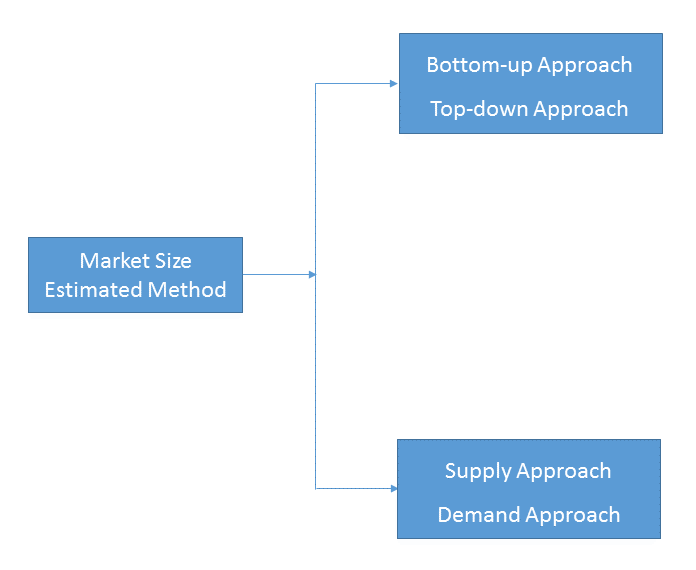
1)Top-down & Bottom-up Approach
Top-down approach uses a general market size figure and determines the percentage that the objective market represents.
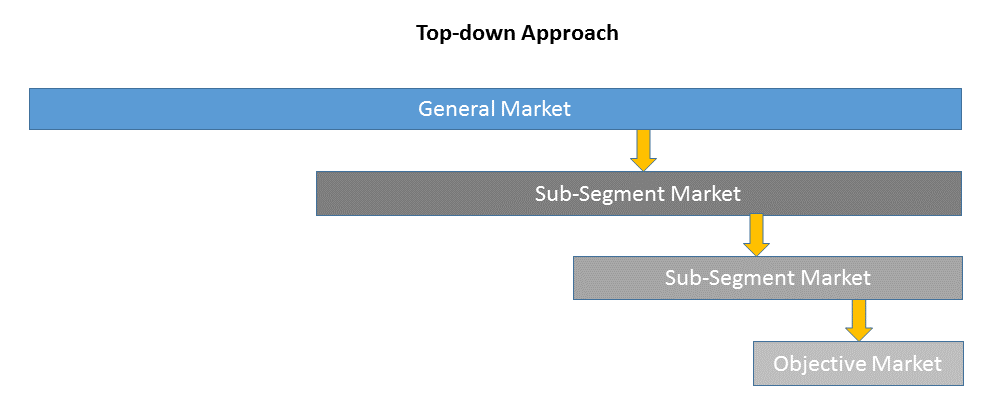
Bottom-up approach size the objective market by collecting the sub-segment information.

2)Supply & Demand Approach
Supply approach is based on assessments of the size of each competitor supplying the objective market.
Demand approach combine end-user data within a market to estimate the objective market size. It is sometimes referred to as bottom-up approach.
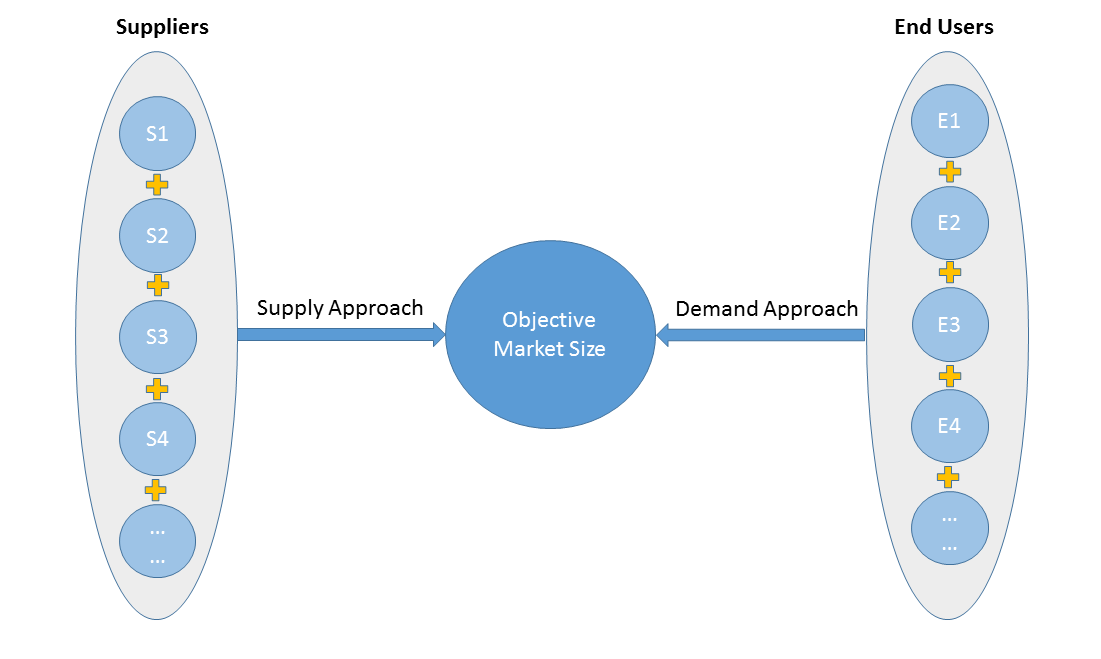
- Forecasting Methodology
- Numerous factors impacting the market trend are considered for forecast model:
- New technology and application in the future;
- New project planned/under contraction;
- Global and regional underlying economic growth;
- Threatens of substitute products;
- Industry expert opinion;
- Policy and Society implication.
- Analysis Tools
1)PEST Analysis
PEST Analysis is a simple and widely used tool that helps our client analyze the Political, Economic, Socio-Cultural, and Technological changes in their business environment.
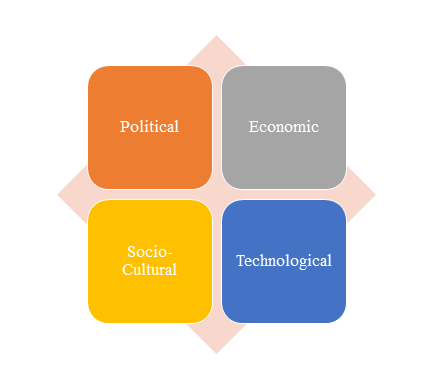
- Benefits of a PEST analysis:
- It helps you to spot business opportunities, and it gives you advanced warning of significant threats.
- It reveals the direction of change within your business environment. This helps you shape what you’re doing, so that you work with change, rather than against it.
- It helps you avoid starting projects that are likely to fail, for reasons beyond your control.
- It can help you break free of unconscious assumptions when you enter a new country, region, or market; because it helps you develop an objective view of this new environment.
2)Porter’s Five Force Model Analysis
The Porter’s Five Force Model is a tool that can be used to analyze the opportunities and overall competitive advantage. The five forces that can assist in determining the competitive intensity and potential attractiveness within a specific area.
- Threat of New Entrants: Profitable industries that yield high returns will attract new firms.
- Threat of Substitutes: A substitute product uses a different technology to try to solve the same economic need.
- Bargaining Power of Customers: the ability of customers to put the firm under pressure, which also affects the customer's sensitivity to price changes.
- Bargaining Power of Suppliers: Suppliers of raw materials, components, labor, and services (such as expertise) to the firm can be a source of power over the firm when there are few substitutes.
- Competitive Rivalry: For most industries the intensity of competitive rivalry is the major determinant of the competitiveness of the industry.
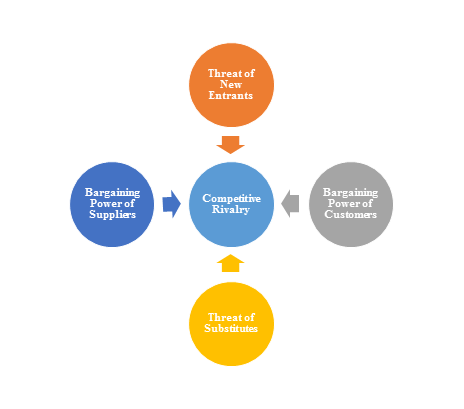
3)Value Chain Analysis
Value chain analysis is a tool to identify activities, within and around the firm and relating these activities to an assessment of competitive strength. Value chain can be analyzed by primary activities and supportive activities. Primary activities include: inbound logistics, operations, outbound logistics, marketing & sales, service. Support activities include: technology development, human resource management, management, finance, legal, planning.
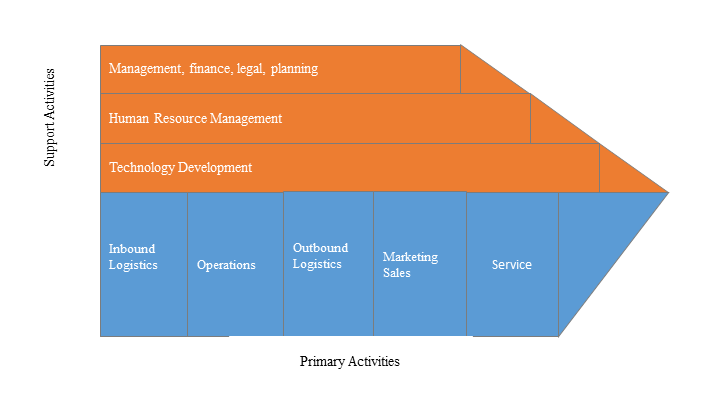
4)SWOT Analysis
SWOT analysis is a tool used to evaluate a company's competitive position by identifying its strengths, weaknesses, opportunities and threats. The strengths and weakness is the inner factor; the opportunities and threats are the external factor. By analyzing the inner and external factors, the analysis can provide the detail information of the position of a player and the characteristics of the industry.
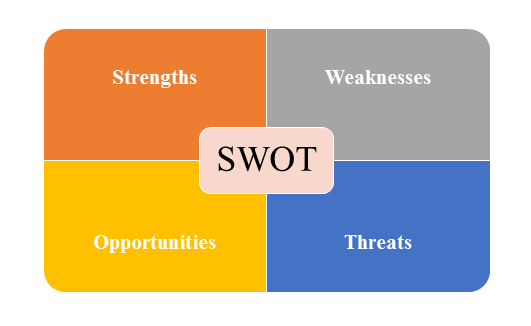
- Strengths describe what the player excels at and separates it from the competition
- Weaknesses stop the player from performing at its optimum level.
- Opportunities refer to favorable external factors that the player can use to give it a competitive advantage.
- Threats refer to factors that have the potential to harm the player.
- Data Sources
| Primary Sources | Secondary Sources |
|---|---|
| Face to face/Phone Interviews with market participants, such as: Manufactures; Distributors; End-users; Experts. Online Survey |
Government/International Organization Data: Annual Report/Presentation/Fact Book Internet Source Information Industry Association Data Free/Purchased Database Market Research Report Book/Journal/News |